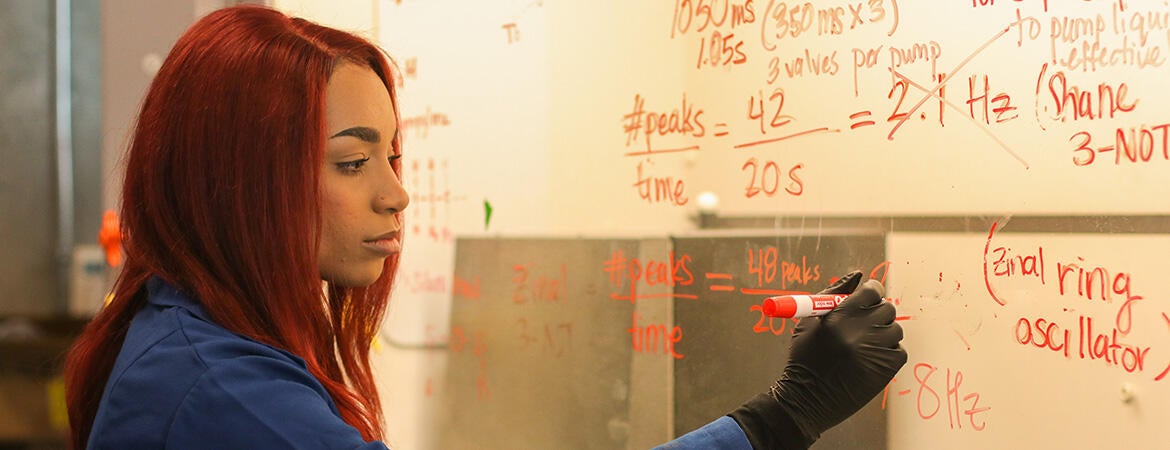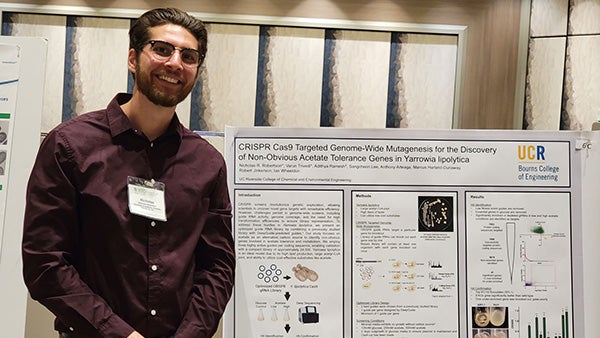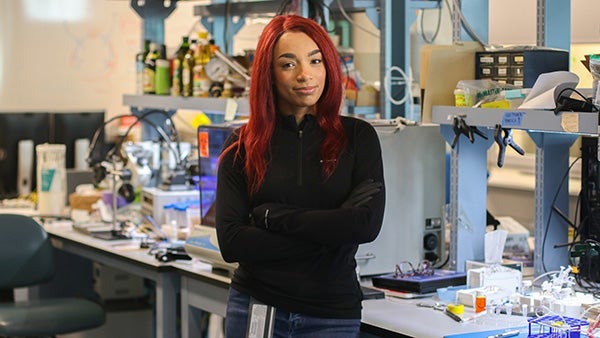
Nicholas Robertson works with “smart yeast’ capable of detecting many types of chemical compounds — from pesticides to opioids.
Samantha Robinson works with a miniaturized technology at the forefront of microchip design, clinical diagnostics, and environmental monitoring.

The two Marlan and Rosemary Bourns College of Engineering graduate students stand positioned for success as research-driven engineers. But now Robertson and Robinson — each working on a PhD in bioengineering — are receiving financial support from a nonprofit to encourage then to complete their degree and launch their engineering careers in the United States.
Both Department of Bioengineering students were recently named recipients of a Koerner Family Foundation fellowship. Each will receive a $12,000 grant to help cover their educational costs so they may focus on completing their programs. Both were among 20 doctoral engineering students from across the nation to receive the annual fellowship.
The fellowships are granted to eligible graduate students who, among other things, express an interest in a research-oriented engineering careers in academia, industry, or government in the United States. The nation is expected to face a shortage of more than six million engineers between 2016 and 2026, according to the U.S. Bureau of Labor Statistics.
Both have also previously distinguished themselves on and off campus several times on the strength of their research-related activities.
Robinson’s research looks at microfluidics, or how fluids and gases move through channels smaller than the width of a human hair and how these properties can be applied to micro-miniature technology that can, for example, detect pathogens and analyze DNA and life-saving drugs with superior precision and reliability. Before she began her doctoral program, she worked in industry focused on the development and fabrication of microfluidic medical devices.
“I love how open-ended microfluidic design is because sometimes it forces you think outside of the box,” Robinson said. “Nothing is off the table if it works. Microfluidics can enhance many areas of research and medicine, such as pathogen detection, sample preparation, diagnostics, and so much more.”

Robinson was the second-place winner of the 2023 Grad Slam for her research on “Microfluidic Automation for Peptide Drug Discovery and Analysis.” When she was a BCOE bioengineering undergraduate, she presented her work at the 2018 UCR Undergraduate Research, Scholarship, and Creative Activity Symposium.
Grad Slam is an annual contest focused on making research accessible and helping to train students how to engage the public with their work. Participants are judged on how clearly they present the key concepts of their research in three minutes or less.
Robertson was also a Grad Slam participant, a finalist for the 2022 competition for his research on “How ‘Smart Yeast’ Can Make Safe Cannabinoids.”
Robertson’s research revolves around “smart yeast,” or a yeast that has been genetically engineered with biosensors. These biosensors allow such yeast to detect certain chemical compounds in the environment or a given system, such as organophosphates, found in pesticides; cannabinoids and terpenes, found in marijuana; or opioids, found in legal and illegal narcotics.
“Being a BCOE student who studies bioengineering allows me to lie at an intersection of fields,” Robertson said. “I am surrounded by engineers, but I study yeast. This environment is conducive to innovation.”
Prior to attending BCOE, Robertson was a kombucha brewer when he was an undergraduate student in Georgia, and he developed a patented device capable of easily and more accurately detecting the levels of alcohol found in the fermented tea beverage. He launched a company, Rare Combinations, to market his alcohol content detectors.
Both students said they were grateful for the fellowship for its encouragement and support.
“Receiving this fellowship has encouraged me to explore more ways of becoming a well-rounded engineer, and how I can use my skills to advance medicine and patient care in America after finishing my PhD,” Robinson said.
Header image: Samantha Robinson in a BCOE engineering lab (Photo credit: Samantha Robinson).